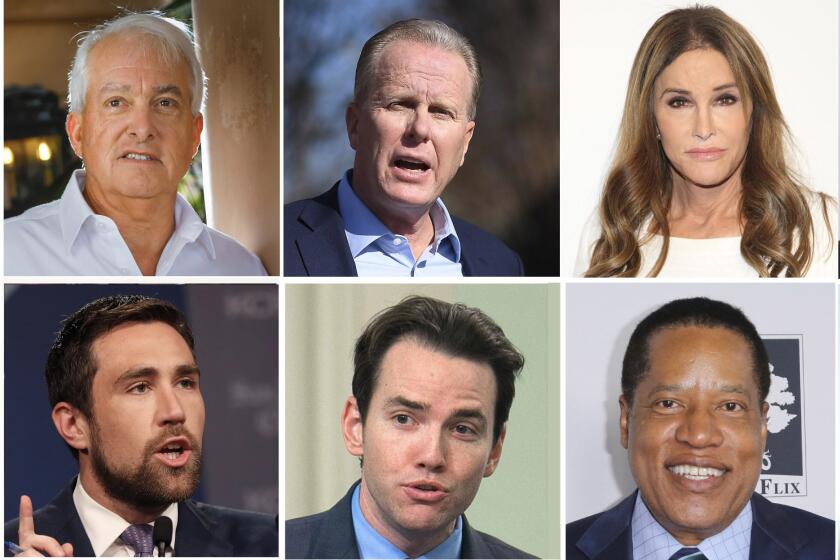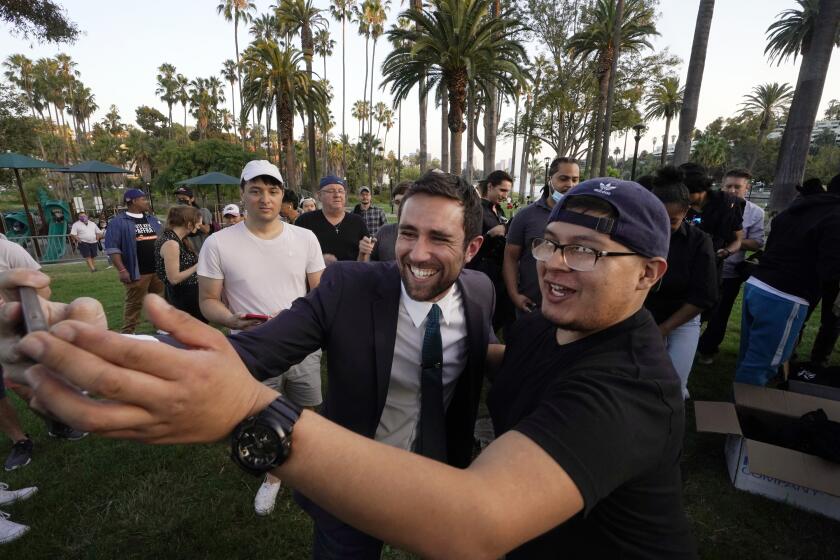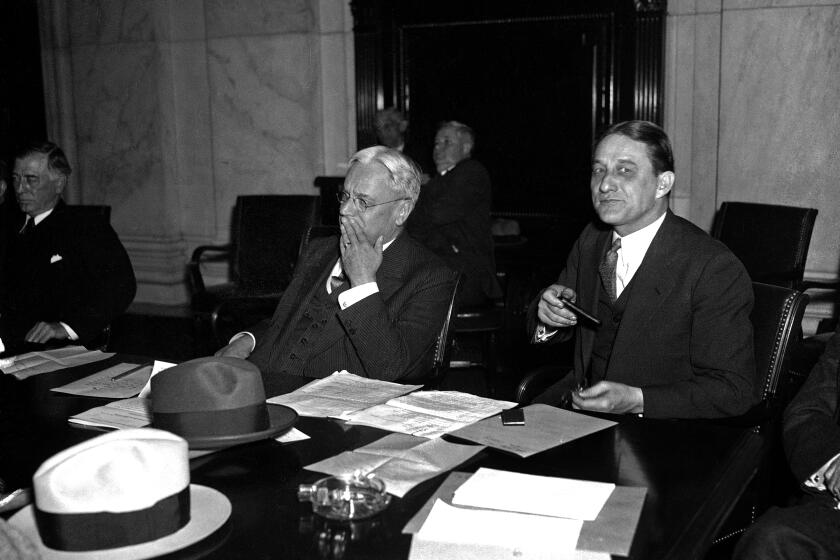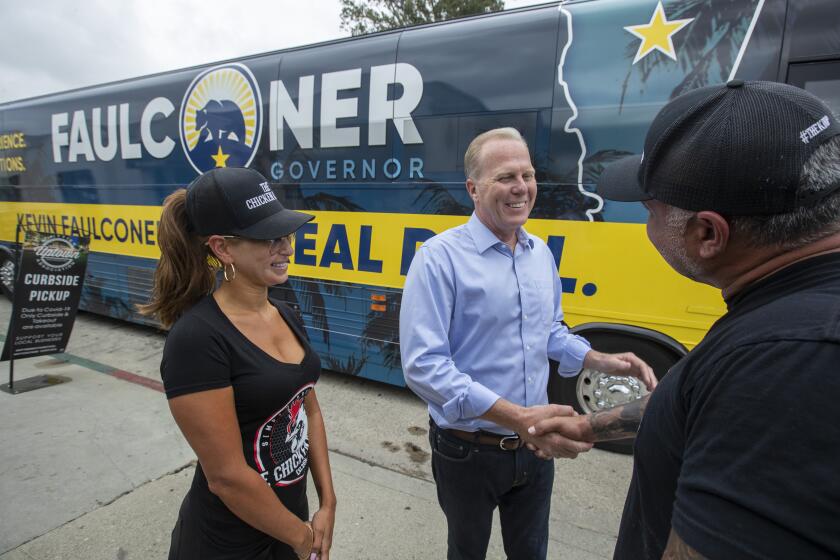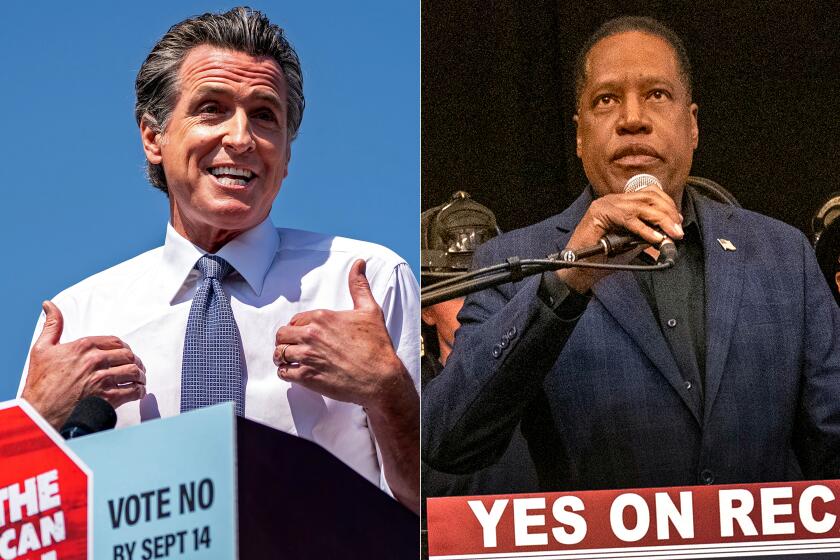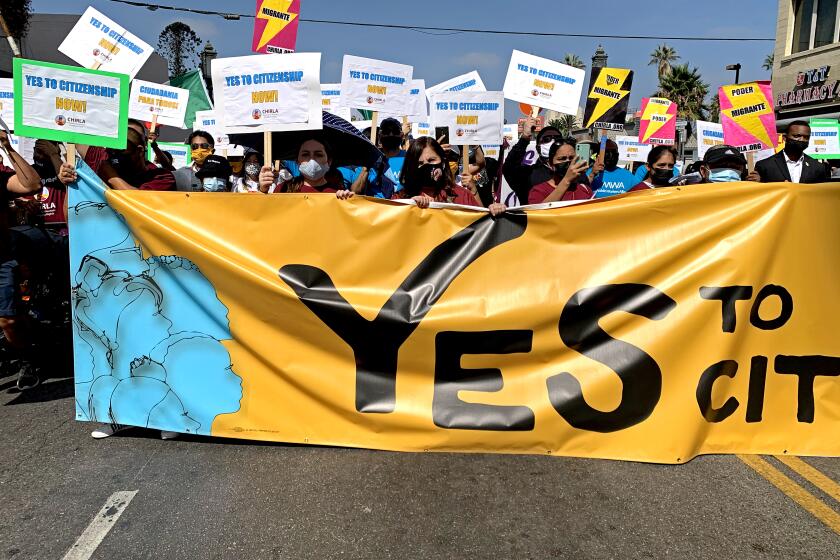A shaman, a rapper and a surgeon: Meet the lesser-known names on your recall ballot
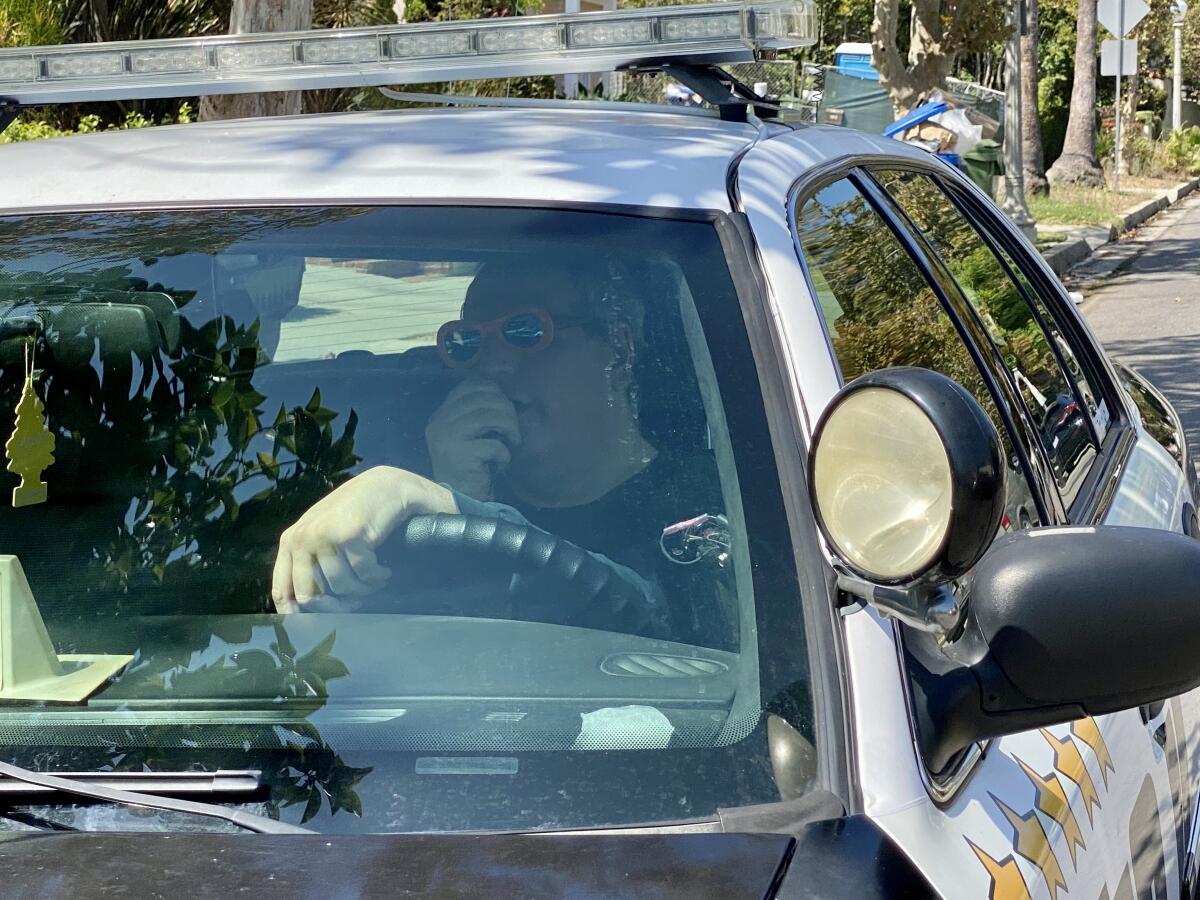
- Share via
Holly Baade’s “pilgrimage for the people” began on the steps of the state Capitol, with the Marin County yoga teacher launching her gubernatorial recall bid by praying to the spirits of California.
“Behold me,” the self-described shaman said, “and see if I am worthy or not to enter the building as the leader of our state.”
Green Party candidate Dan Kapelovitz blasted his message through the streets of Los Angeles from a decommissioned police car he bought on Craigslist. “Dan Kapelovitz for governor,” he yelled over the car’s public address system as he cruised down Larchmont Boulevard. “Can yooooouuu dig it?”
When Jacqueline McGowan needs to calm down mid-debate, the Democratic candidate has been known to take a toke off a joint. Off the campaign trail, she makes her living as a cannabis consultant.
With the state careening toward its second-ever gubernatorial recall election, the spotlight has fixed on five or six marquee candidates. But they are far from the only hopefuls in the race.
More than three dozen other people have upended their lives to plunge headlong into the backwaters of democracy.
This is what voters need to know about the Sept. 14 recall election.
Their motives vary, and a few attention seekers appear to be running to raise awareness around a single issue or take part in something akin to performance art. But, deluded or not, most candidates seem to genuinely believe that they are the best person to shepherd a state of nearly 40 million people into the future.
“To some extent, running in the recall is like going to Vegas,” said veteran Democratic strategist Darry Sragow, noting that outsider candidates have a much harder time breaking through the noise in regular elections, when there are more races on the ballot.
The unusual recall election landscape — with its frenzied media attention and simplified ballot — creates the sense “that it’s worth placing a bet,” he said.
Some have mounted traditional professional campaigns, like Oxnard pastor Sam Gallucci, who has six paid staff members and consultants, or Redding business owner Jenny Rae Le Roux, who has been running digital ads along with Spanish, Mandarin, and Vietnamese radio spots.
Many of the others, however, are more or less one-man bands, with no paid staff, consultants or advertising budgets.
“Everybody that’s on my team is doing this for the good of California,” Fresno rapper and activist Nickolas Wildstar said of his all-volunteer campaign staff. “They would like to see me serve the people as governor.”
Back on Larchmont, a handful of people at sidewalk tables looked up quizzically as Kapelovitz’s voice blared from his Crown Victoria.
Of the 46 candidates seeking to replace Gov. Gavin Newsom in a recall election, several are well-known. Others are more obscure.
The criminal defense attorney’s oft-repeated catchphrase — “Can you dig it?” — is also his candidate statement in the information guide mailed to voters. (Candidates were charged $25 per word for their statements, meaning it was a relative steal for Kapelovitz to ask 22 million Californians if they could dig it — at least compared with the thousands of dollars that other candidates spent printing full campaign platforms.)
“Probably got a few votes there. It’s kind of subliminal, really,” Kapelovitz deadpanned.
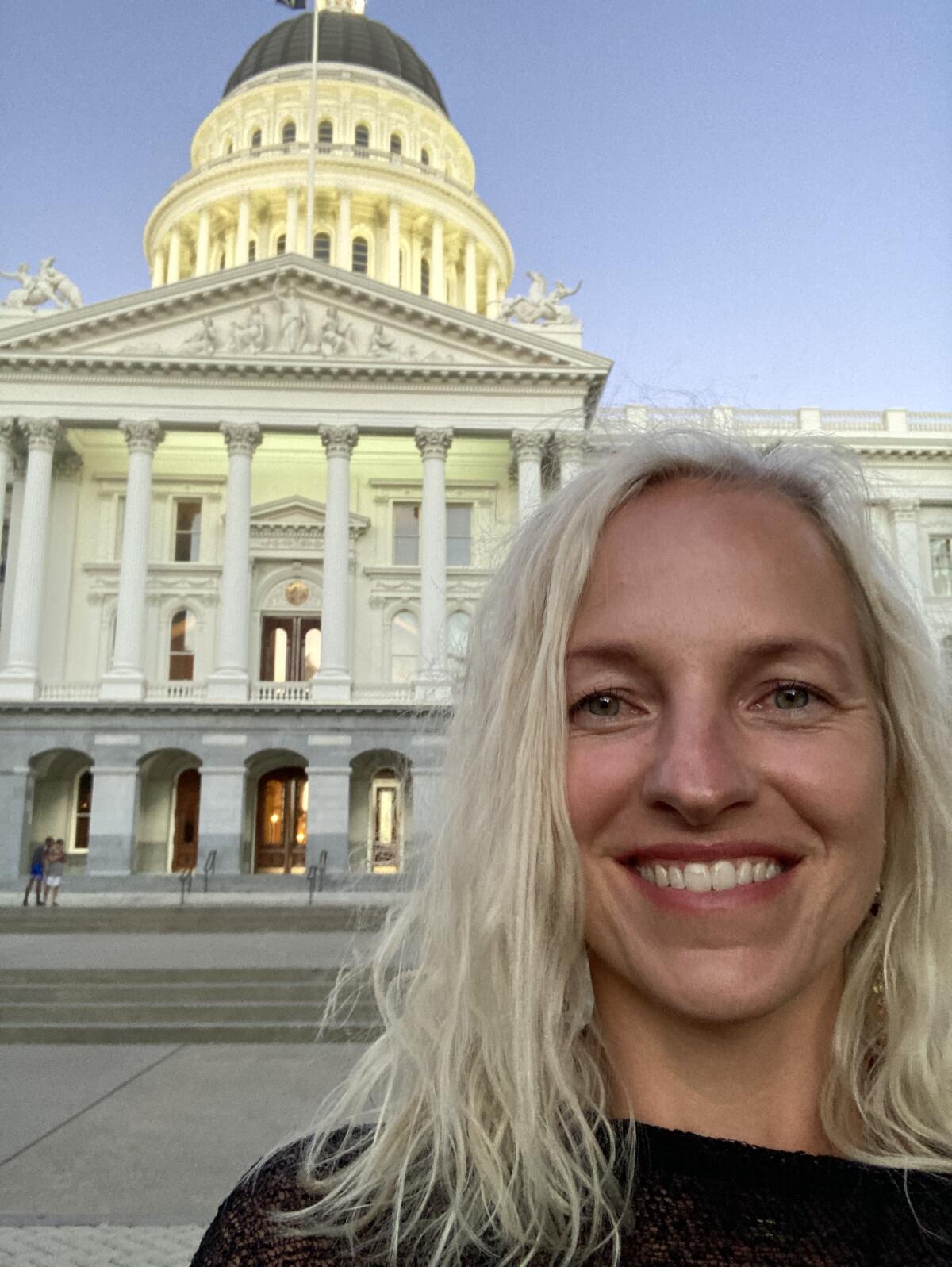
Baade, the yoga teacher, has been sleeping in the back of her 2004 Toyota 4Runner, “guided by her heart” as she crisscrosses the state. She has prayed with Indigenous elders atop Mt. Shasta, spoken against drone technology in Nevada County, marched for the climate in San Francisco and rollerbladed through Sacramento in shiny pink skates to protest COVID-19 vaccinations, which she characterizes as “poison.”
Excluded from televised debates, some of the candidates have participated in social media forums hosted by fringe groups, including the California Independence Movement, which promotes secession from the United States, and Take California Back, which appears to be loosely affiliated with followers of the late cult figure Lyndon LaRouche.
In one recent forum, a candidate momentarily shuffled his camera to reveal more than he wanted: He was wearing shorts below his collared shirt and tie.
James Hanink, an Inglewood-based candidate with the American Solidarity Party, said he followed the advice of his campaign manager regarding participation in the virtual forums, saying, “Beggars can’t be choosers.”
Hanink, who turned down an invitation to a recent in-person event in San Diego because he doesn’t like to drive on the freeway, characterized himself and his fellow virtual debaters as the “off-off-Broadway” people in the race.
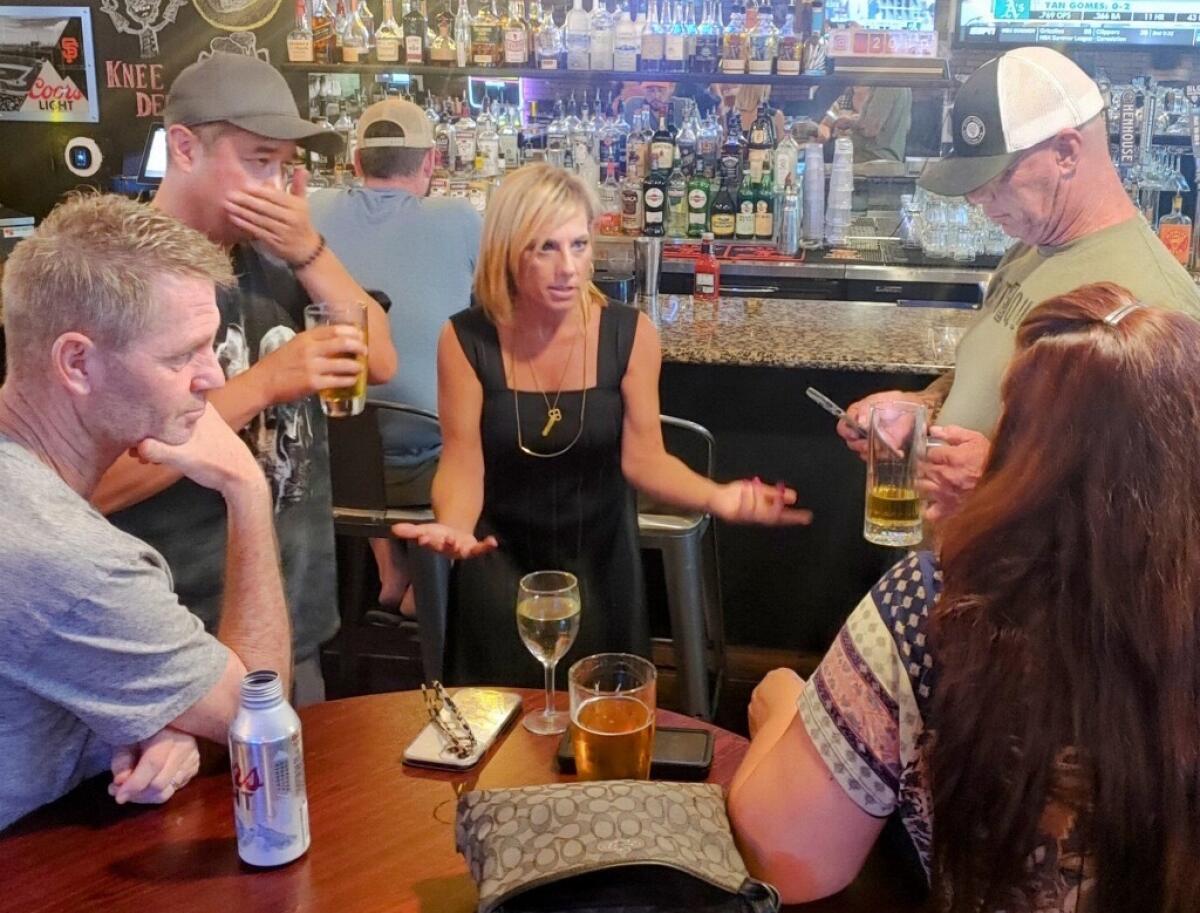
But to the former philosophy professor, that wasn’t necessarily a bad thing.
Fine drama, he said, often emerges far from the lights of the Great White Way.
Another debate participant, Republican candidate David Bramante, is active on TikTok, on which he posts largely about gun rights, medical freedom and car culture. But Bramante said he’s striving to learn more about farming, immigration and water supply — the main issues he gets asked about.
The Calabasas real estate agent spent a recent Monday morning driving through Camarillo, pulling his 1995 Eurovan off the freeway at three farms to try to speak with agricultural workers.
“It’s a little hard to break the ice,” said Bramante, who is not fluent in Spanish. “That’s why I’m going to go back out a couple more times this week.”
The campaign grind can be relentless, even for candidates on the fringes of the race.
Like several other candidates, aircraft mechanic and actor David Hillberg can’t afford to host his own events, so he has been seeking exposure at regional GOP forums.
Twenty-one hours into one of the longest days of his campaign, Hillberg briefly fell asleep at the wheel of his pickup truck. He’d left his Fountain Valley home at 3 a.m. to make the seven-hour drive to Santa Rosa, pitch his candidacy at the Sonoma County Republican Convention and turn back around. But the fatigue set in during the homestretch of his drive back to Orange County.
Kevin Paffrath’s real estate advice has attracted 1.7 million YouTube followers. The Democrat is a potential contender in the recall.
“Somebody basically honked their horn at me when I did pass out and woke me up,” Hillberg recalled. “So it kind of saved my bacon.”
McGowan, whose cannabis-centric campaign has multiple paid staffers, compared the experience of running to “chugging water from a fire hydrant every single day.” She has set alerts on her phone just to remind her to eat and take vitamins.
She said phone and email conversations with prospective voters were “the fuel keeping me going.”
Like or hate California’s recall process, it is hard to argue that there is a purer, more uncut form of democracy than the daily conversations between lesser-known candidates and the very small contingent of voters who seemingly spend hours going down the list, earnestly trying to get every contender on the phone before they make their decision.
Twenty-five candidates have phone numbers printed in the guide, and several of those numbers go directly to personal cellphones.
Some callers want a personalized campaign pitch. Others are audibly inebriated or clearly joking. A few just want to see whether anyone will actually pick up the phone.
“I get calls all day, every day — Monday through Sunday — at all hours,” Bramante said. One octogenarian voter in San Diego has called him three times.
San Diego doctor and Democratic candidate Brandon Ross receives 150 to 200 voter emails a day and strives to respond to all of them. Ross also typically begins performing surgery around 7:30 a.m. during the week.
“I’ll put in anesthesia and then I’ll have to let it set for a little bit and I’ll have a little 15-minute break,” Ross said of the stray moments he finds to respond to voters while performing hair transplants at his La Mesa clinic.
Californians amended their Constitution 110 years ago to allow ballot initiatives, referendums and recalls.
Moved by the story of addiction and recovery that Ross shared in his candidate statement, many of his correspondents share raw stories of their own family members’ struggles with addiction.
Others ask more quotidian policy questions, like the emailer who recently asked Ross whether he would agree to legalize pet ferrets in California.
Many candidates spoke of an unlikely camaraderie with fellow candidates. They aren’t friends, exactly, but they run into one another at virtual and in-person forums, share a certain respect and occasionally even lend a helping hand.
“Even if they think the other people are crazy with their political beliefs, which I think about a lot of the other candidates, I still am very happy that they’re running,” said Daniel Watts, a San Diego free speech attorney and two-time recall candidate.
Adam Papagan, a self-described entertainer who leads O.J. Simpson trial tours in a white Bronco, posed shirtless in a red hot tub shortly after filing his campaign papers. He ventured that he was the only candidate who’d spent the weekend in the desert making a record with his band.
The tour operator took issue with a recent headline about the “regular people” running for governor.
Only in California, he said, “would I be considered a ‘regular guy.’”
More to Read
Sign up for Essential California
The most important California stories and recommendations in your inbox every morning.
You may occasionally receive promotional content from the Los Angeles Times.
